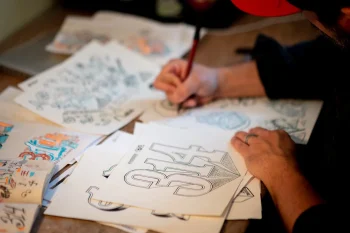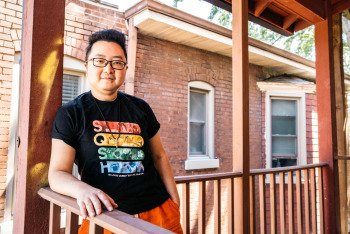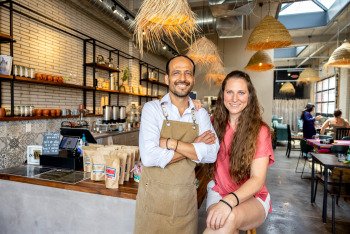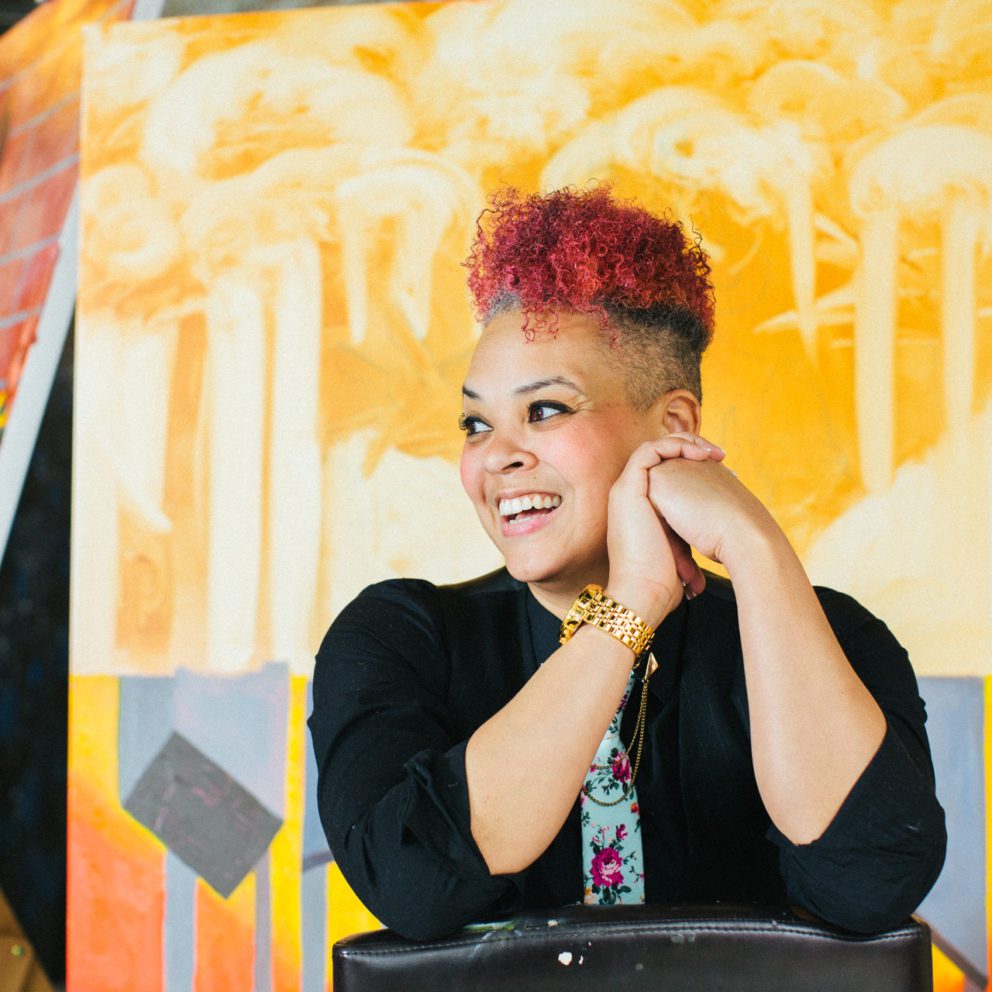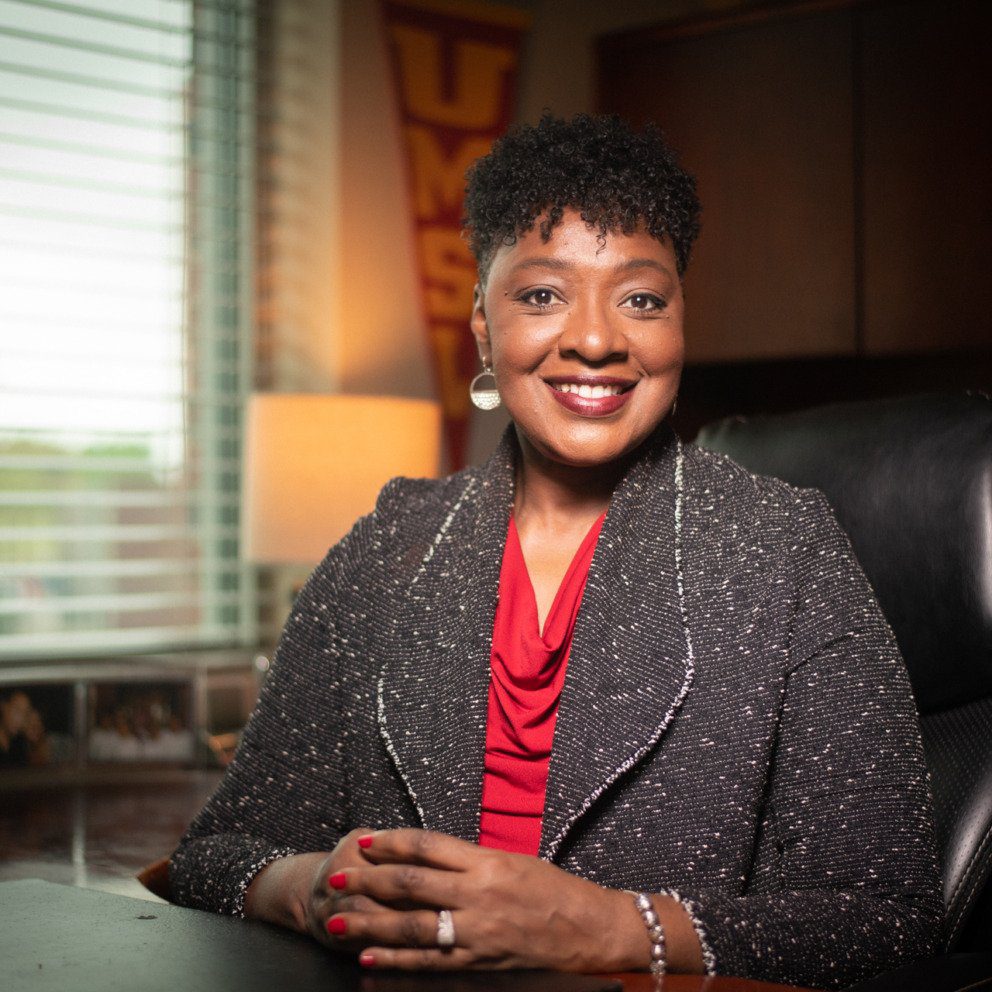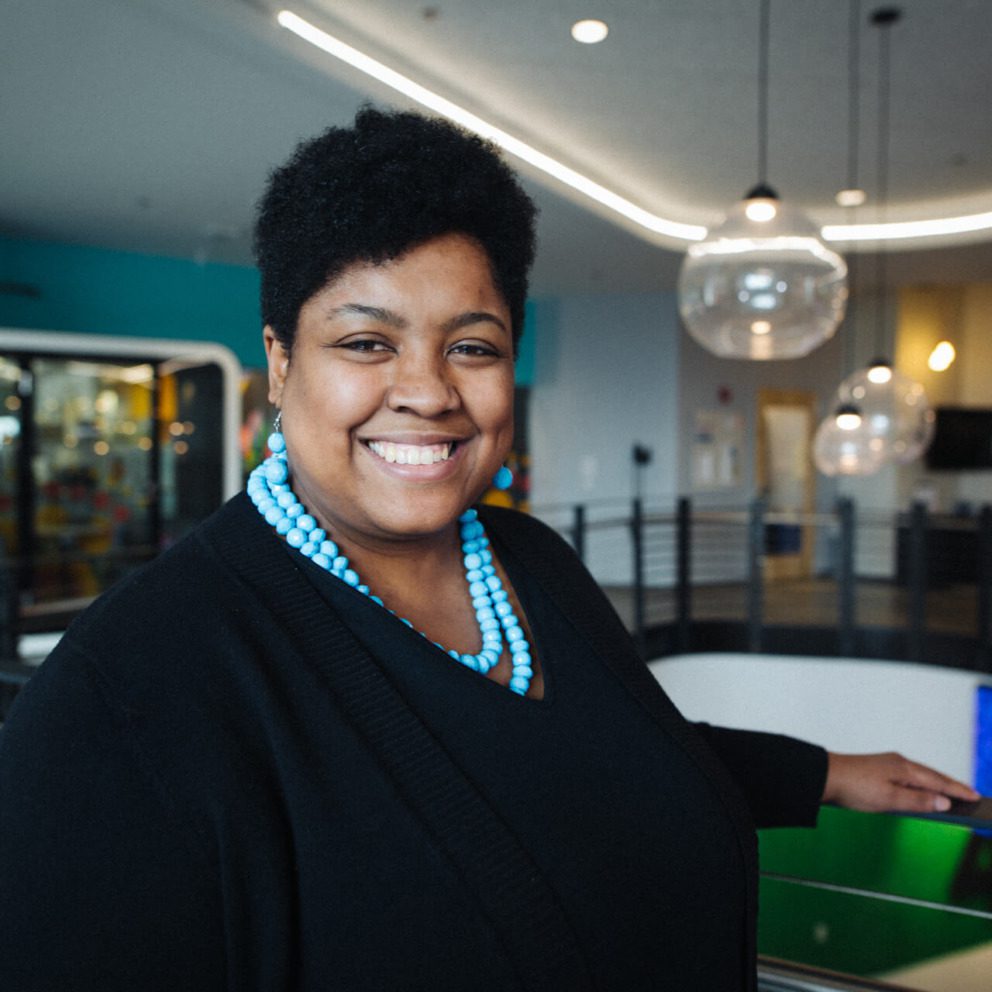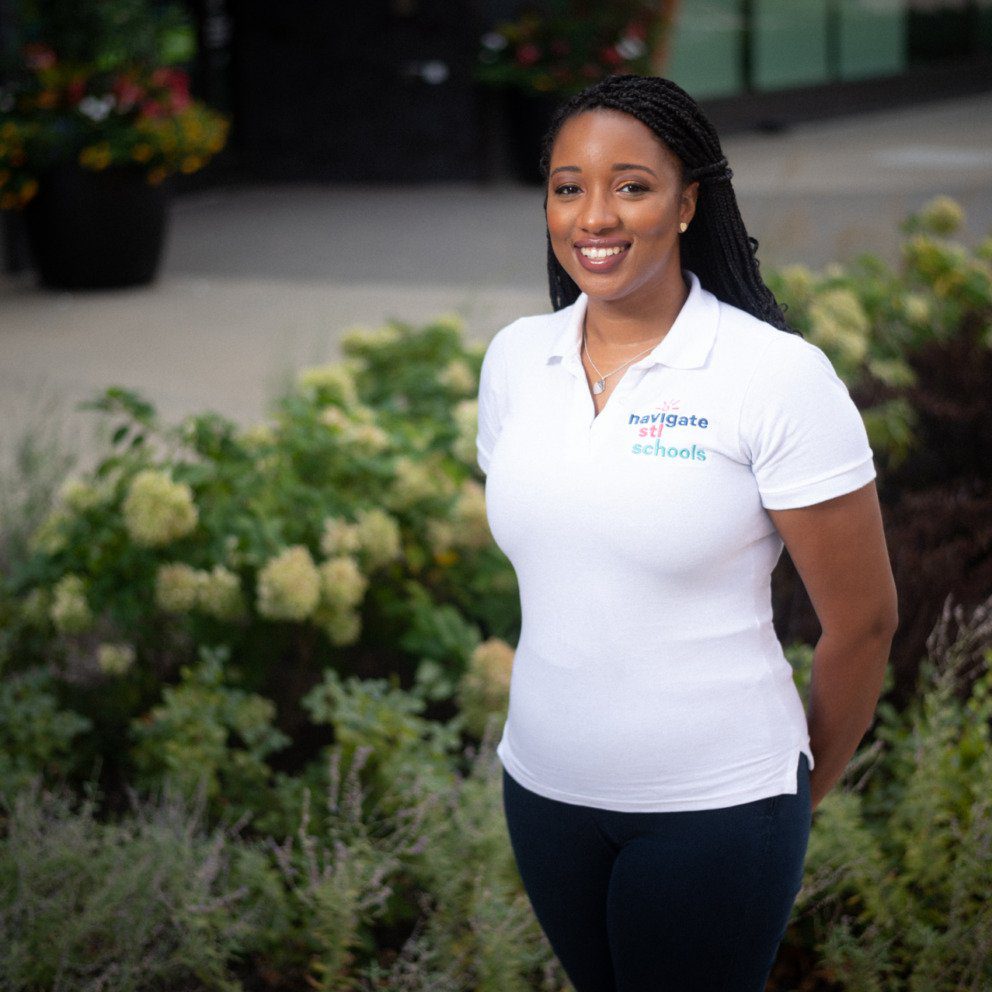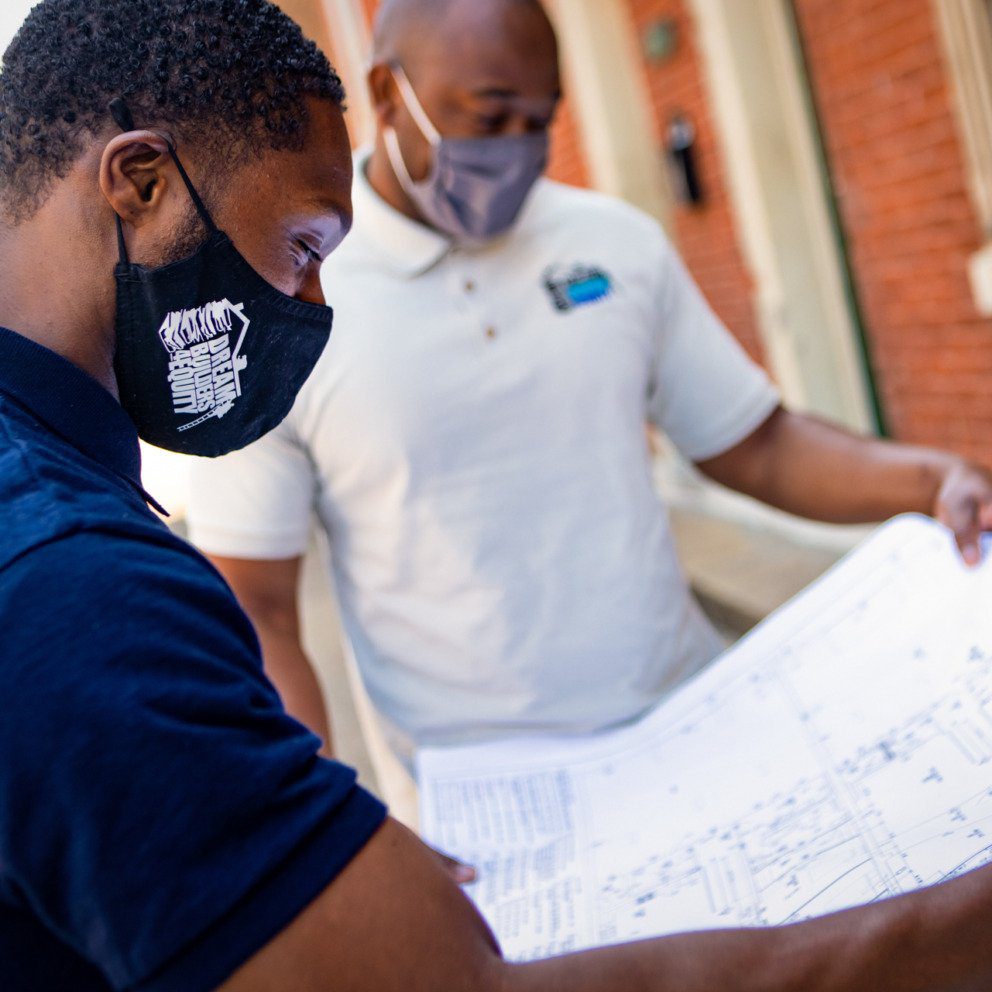Giving Lessons
With the support of her local Buy Nothing group, Briana Morales guides her students in East St. Louis through social-emotional learning as well as their academic education.
Two years ago, Briana Morales put out a simple request for some old newspaper clippings on a Tower Grove South community Facebook page. Her need was simple in scope; she and the students in her high school English class at East St. Louis School District’s Gordon Bush Alternative Center were working on a poetry project that addressed perceptions about their community versus the reality of their lived experiences. She was looking for articles that focused on crime, poverty and distress, with the hope of giving her students the power to take back that narrative. What she found, however, would give them so much more.
“Someone asked me if I’d posted in the local Buy Nothing group, because there was sure to be something in there,” Morales says. “I joined the group and realized right away that there was always someone to give whatever someone else needed. That’s the mission; we give out of our abundance so that, together, we have everything we need. I saw this as a way to fill in the needs and gaps for my students in a way that humanizes them, respects their dignity and lets them know that they are deserving of love and care.”
For Morales, these notions of dignity, humanization and empowerment dovetail with her philosophy of education as a whole. Rather than simply focusing on the academic pursuits inside the classroom, Morales believes that education is about the whole person, and even the broader community to which they belong. It’s why she got into teaching in the first place. A survivor of childhood trauma herself, Morales credits her seventh-grade teacher with helping her process her experiences through writing – something that turned her from someone who would lash out at others from a place of hurt and anger into someone who is now using those same tools to help her own students deal with their own trauma.
At the Gordon Bush Alternative Center, Morales sees her younger self in her students every day. Part of the East St. Louis School District, Gordon Bush is set up as a place where kids who have not been successful in the traditional classroom can go to accommodate their needs ranging from attendance and academics to more positive emotional support. As Morales describes it, Gordon Bush is less about exclusionary discipline, as alternative schools so often are seen as providing, but rather as a place of restorative justice that brings social emotional learning into the classroom through a trauma-informed approach.
Morales witnessed the need for this approach to education in East St. Louis before she even stepped foot inside the classroom five years ago. While in school, she did service work in East. St. Louis with the Orr-Weathers housing development and Catholic Urban Programs. Her role was to help out with after-school programs, which led her to understand the need to be a partner with the people she served.
“The need in the places where people are most marginalized is high, but when you come in and have this idea that people need to be saved, you need to understand that it’s more of a partnership,” Morales says. “It was important for me to understand that we walk with the people we serve, and whatever we have to give to others, they also have something to share with us.”
Morales’ service experience made her realize that she wanted to be a part of the East St. Louis School District after she graduated from college, and after one year in another district, she landed at Gordon Bush, where she has taught 11th and 12th grade English since 2018. There, she immediately realized that any sort of behavioral or academic issues her students had were actually their ways of asking for help. From her own experience, she knew that healing meant learning the tools to process their trauma through writing, but she also understood that was only part of the need.
“One of the main ways I have helped them is by giving them a voice, but that only goes so far in terms of what they realistically need,” Morales explains. “It’s great that they feel loved during those eight hours of the school day, but when they get home, they need resources too. We can’t just either educate or meet basic needs; they need both, and as educators, we need to make sure we are taking care of children and young people as a whole.”
As Morales observed, those needs involved some of the most basic necessities. Food, hygiene items, laundry detergent, dishwashing soap and even water bottles were real resources her students needed, and until they were met, it was difficult to focus on academics. At first, she tried to supply these items out of her own pocket, but living off a teacher’s salary, she was limited in what she could provide. That’s where Buy Nothing came in.
Much more of a social movement than a way to simply get and get rid of excess things around the house, the Southwest St. Louis Buy Nothing Facebook group is part of a gift economy affiliation with groups across the country and in 44 nations. Founded in 2013 in the state of Washington, the goal of Buy Nothing is to create a network of connections among neighbors for people to give back to their community by sharing their abundance. Completely cashless and volunteer-run, Buy Nothing groups also have the goal of reducing what goes into landfills by giving new life to things that are rehomed to where they will be useful.
Buy Nothing is not just a recycling or giveaway platform, however. Though material things make up the majority of listings, people may also list services, rides to and from the doctor and even poetry. The point is to empower everyone on the platform, whether giving or receiving, to find creative ways to engage with their community and show how much value we all have, however that’s quantified.
“The Buy Nothing group has really humanized my students in the things they give,” Morales says. “A lot of times when people give to the homeless or to a school drive, they give things they don’t want anymore. We’ve gotten things from our Amazon wish list and nice, brand-new things that the students wouldn’t have been able to afford. It inspires me that they realize these young people are human beings, and they respect their dignity by showing them that we are all deserving of love and care in this life, and they are willing to give that to kids they don’t even know.”
One particularly impactful donation from the Buy Nothing group involved three of Morales’ former students who were first-generation college students bound for Lincoln University in Jefferson City. Though the group helped the students gather toiletries and supplies for their dorm rooms, the students were still short on their housing deposit and were on the verge of being sent home. Morales sprang into action, setting up a fundraiser on the site that not only raised enough money to pay the deposits, it also allowed each student to purchase a Chromebook for use in their studies.
“I think about all the dreams and wishes that live inside our young people, the grand potential they have to make a difference in the world, and what a better place it might be for all of us if everyone helped one another with the resources they need to achieve their goals,” Morales says. “That’s the community I am a part of because of Buy Nothing, and one that I want to instill in my own students to create for those around them.”
Now, two years into her relationship with the Buy Nothing group, Morales is again stocking her classroom closet full of items for her students as they begin the new school year, focused as much on meeting the personal needs of the young people she serves and their families as much as the academic ones. As she’s observed, the little, practical things that the group has provided have had tremendous impact on her students’ lives in ways that have allowed them the space to focus on other things rather than just basic survival. Once those are met, the processing, healing and learning can begin, empowering the students to flourish and become the people they were meant to be.
“Our moral responsibility as educators is to help them break the chains so that they can have a fighting chance at the life they deserve,” Morales says. “If we, as educators, work in a more liberatory approach, it will unlock their genius potential and opportunities for healing in the classroom. That’s where we realize the dignity of each person. Helping them become capable and deserving of love is at the center of this work and is what it means to be a community. We are worthy people and are valuable to each other in so many different ways.”
“We all just need to realize what we are capable of.”
Join the Story
- Locate a Buy Nothing group near you.
- Find a classroom to support through Donors Choose.

